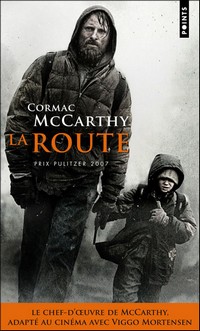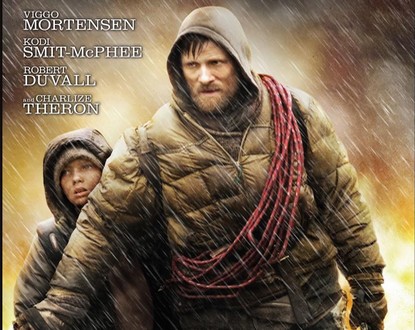No date. No names. Barely a location, vague, the United States. A man and his son. The apocalypse has occurred. There is nothing left or almost nothing.
In the freezing winter, on devastated lands, they move southward. But for what purpose? To go where?
From the end of the world, only heaps of gray ashes and hordes of cannibals remain. Will they reach the end of their journey?
This stripped-down story by Cormac McCarthy, with its simplistic plot, possesses an incredible intensity, a Road that will not leave the reader unscathed.
 What strikes you from the outset in this post-apocalyptic novel is the text’s structure. Short paragraphs, sentences punctuated with numerous “ands,” quick dialogues, no chapters; this sequence of paragraphs gives rhythm to the reading. It is very well written, although the style can be slightly unsettling at the beginning.
What strikes you from the outset in this post-apocalyptic novel is the text’s structure. Short paragraphs, sentences punctuated with numerous “ands,” quick dialogues, no chapters; this sequence of paragraphs gives rhythm to the reading. It is very well written, although the style can be slightly unsettling at the beginning.
The story of this man and his son, on a destroyed land, is truly poignant. The very simple dialogues between the two characters are imbued with a unique genuine tenderness. It’s not the tenderness we know, it’s a different, stronger emotion. They are alone, the man has nothing but his son, the son has nothing but his father, and this is very well conveyed by the author, providing a powerful portrayal of a father/son relationship.
We know nothing about the characters, not even their names, barely their ages, and almost nothing about their past. They move forward, getting up each morning to head further south, as that is the only goal they have left. The motivation that keeps them going. From the first pages, you can feel the protection, the well-being that the father tries to provide the child.
We also don’t know what happened to the earth, leaving the reader to choose the tragedy… Nuclear incident? New world war? Alien invasion? Meteor? The author gives no explanation, and this enhances the novel’s haunting nature. This uncertainty about the future, and the obscurity of the past, make the story incredibly realistic.
One might criticize The Road for its lack of action or its repetitive situations, but regardless, the emotion is there, strong and painful. We witness the initiation of a child by his father, who prepares him for a bleak future, a tough survival, while trying to impart certain values that may seem obsolete or words that might never be useful again. You can feel the cold, the ash seeping into throats, the cold rain, the vanished sun, the prevailing gloom, and you are gut-wrenched by so much paternal love, by so many feelings distilled in so few words, by these horrible encounters they narrowly escape.
The Road is a very beautiful novel, moving, intense, and never has a father/son relationship been so well portrayed.


